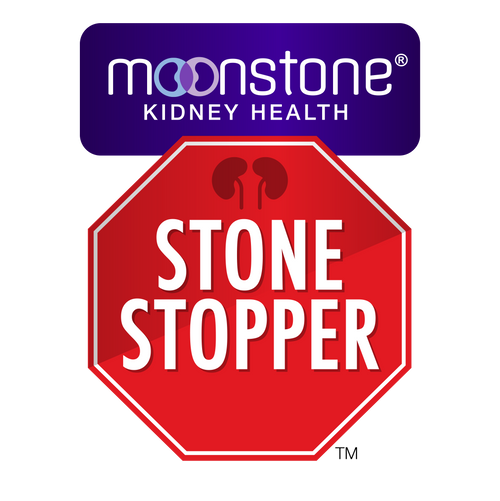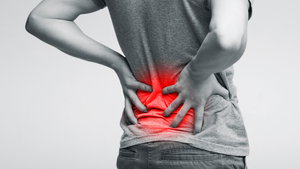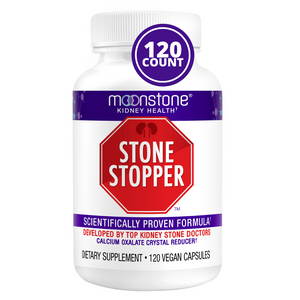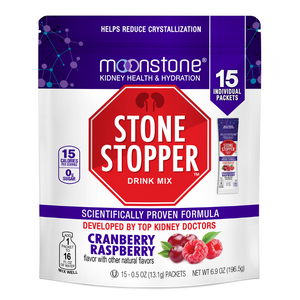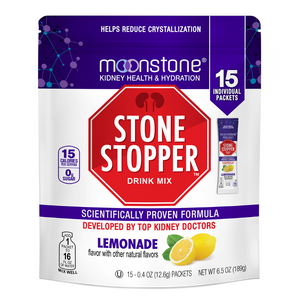Kidney stone pain is sharp and excruciating. 1 in 10 adults will deal with kidney stones in their lifetime, making it more common than most realize. However, there are some natural remedies and self-care practices that can be highly effective in helping alleviate kidney stone pain and even preventing the formation of new stones. Whether you're dealing with the discomfort of a current kidney stone or looking to prevent future stones, you can find some tips and guidance below that will provide you with the information you need to take control of your kidney health.
Kidney Stone Pain Causes & Symptoms
Kidney pain may not necessarily mean you have a kidney stone. Pain could be caused by urinary tract infections (UTIs), kidney infections, and bladder infections. However, one of the most common causes of kidney pain is the presence of kidney stones.
Kidney stones are hard, crystalline deposits that form in the kidneys and cause severe pain as they move through the urinary tract. Kidney stones causes can range from people who have a diet high in oxalates, are dehydrated, have certain medical conditions (for example: hyperparathyroidism), or even those with a family history of kidney stones.
Common kidney stone symptoms include:
- Sharp pain in the side, back, or lower abdomen
- Painful urination
- Blood in the urine
- Nausea and vomiting
- Difficulty passing urine
- Fever and chills (if there's an infection present)
Not all kidney stones cause pain, so signs of kidney stones may not be apparent in all people. It's important to consult with your doctor if you have any concerns, but especially if you're experiencing any of the symptoms above.

5 Home Remedies for Kidney Stone Pain
-
Water - Staying hydrated is crucial for flushing out kidney stones. Even adding certain things to your water can help make it even more effective:
- Add citrus fruits like lemons and limes. The citric acid in these help break down kidney stones, making them easier to pass.
- Adding a small amount of apple cider vinegar to your water has similarly been shown to help dissolve kidney stones and reduce pain.
-
Juices - Certain juices can also be helpful in alleviating kidney stone pain.
- Cranberry juice can help prevent UTIs and reduce inflammation in the urinary tract.
- Parsley juice is a natural diuretic that can help flush out kidney stones.
- Basil juice has been shown to help reduce the size of kidney stones.
- Celery juice is also a natural diuretic and can help increase urine production.
- Pomegranate juice is rich in antioxidants and can help reduce oxidative stress in the kidneys.
- Wheatgrass & banana stem juice have been shown to help prevent the formation of kidney stones.
-
Other fluids - In addition to water and juices, other fluids can also be helpful in managing kidney stone pain.
- Herbal teas, such as dandelion and hibiscus, can help promote kidney health and flush out toxins.
- Diet lemon-lime sodas can help increase urine production and flush out kidney stones.
- Wine (in moderation) may also provide benefits due to its antioxidant content, but it's essential to avoid or limit alcohol consumption, as it can increase dehydration and exacerbate kidney stone symptoms.
- Prebiotics & probiotics - Maintaining a healthy gut microbiome is crucial for overall health, including kidney health. Prebiotics and probiotics can help improve gut health and reduce the risk of kidney stone formation.
- Gently moving around - While it may be tempting to stay still when dealing with kidney stone pain, gentle movement can actually be helpful in alleviating symptoms. Walking and light exercise can help stimulate blood flow and promote kidney function, leading to a faster recovery. (Just remember not to do too much too fast. Keep the weightlifting for another day!)

Self-Care Tips
- Making dietary changes can help prevent the formation of kidney stones and reduce pain associated with existing stones.
- Eating a diet that is low in sodium and saturated fats can help prevent the formation of new stones.
- Limiting meat intake to lean proteins can help reduce the amount of uric acid in the body, which can contribute to kidney stone formation.
- Avoiding oxalate-heavy foods, such as spinach, rhubarb, and beets, can help prevent the formation of calcium oxalate stones.
- Limiting calcium intake to 2-3 servings a day can also help reduce the risk of calcium-based stone formation.
- Soaking in a warm Epsom salt bath can help alleviate kidney stone pain by relaxing the muscles and reducing inflammation. Epsom salt is a natural anti-inflammatory agent that can help reduce pain and swelling.
- Applying heat to the affected area can help relieve kidney stone pain. Placing a heating pad or hot water bottle on the lower back can help relax the muscles and reduce pain. Alternatively, taking a warm bath or shower can also provide relief.
- Over-the-counter pain relievers such as ibuprofen and acetaminophen can help reduce kidney stone pain. However, it's important to avoid aspirin, as it can increase the risk of bleeding and kidney damage. Be sure to follow the recommended dosage and speak with your healthcare provider before taking any medication.
Incorporating these self-care practices into your daily routine can help manage kidney stone pain and promote overall kidney health. If you experience severe or persistent pain, be sure to seek medical attention to rule out any serious complications.
Not All Kidney Pain is Treatable with At-Home Remedies
While these home remedies and self-care tips can be effective in managing kidney stone pain, it's important to note that not all kidney pain is treatable at home. Kidney stones under 4mm typically pass on their own, but anything between 4-6mm only has a 60% chance it'll pass without medical intervention. Anything larger than 6mm will almost always need medical care to be removed.
It's important to also be aware that kidney pain can be a symptom of a more serious underlying condition, such as a kidney infection or a urinary tract obstruction. If you experience severe or persistent pain, it's important to consult a doctor immediately.
By following a healthy diet, staying hydrated, and practicing good self-care habits, however, you can help reduce your risk of kidney stone formation and maintain overall kidney health. Taking a Moonstone Stone Stopper™ supplement in the form of a tasty no-sugar drink mix or capsules can also help to prevent new stones from forming. Learn more about the science of our award-winning kidney stone supplement here.


